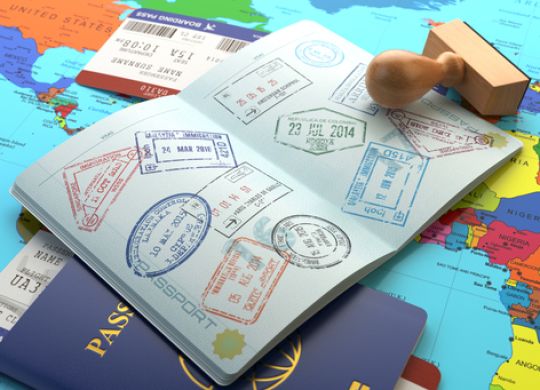From January 1, 2025, Bulgaria and Romania become fully part of Schengen Area: what will change for tourists?

The Schengen area, a symbol of free travel within Europe, is preparing to expand. According to official reports, Romania and Bulgaria will join the visa-free zone from January 1, 2025. This decision will allow people to travel freely without passport control at internal borders with other members of the zone. Find out how such innovations could affect tourists and what benefits you can expect
From 1 January 2025, Romania and Bulgaria will officially become full members of the Schengen area. This decision will allow 450 million citizens to travel freely between the member states.
Both countries have been EU members since 2007, but previously they were not part of the visa-free zone, so tourists were forced to show their passports when entering each of them. From now on, border controls have been simplified.
Everything you need to know about traveling to and from Romania and Bulgaria is further in this article.
What will change for tourists after Bulgaria and Romania join the Schengen area?
One of the main advantages of full entry into the Schengen area is the abolition of passport controls for those arriving by any mode of transport from other Schengen countries.
From 31 March 2024, Romania and Bulgaria have entered the Schengen area by air and sea, but not by land. This rule will now apply to all modes of transport.
However, it is too early to talk about the complete abolition of border checks. Although Romania and Bulgaria will be full members, the European Commission is not yet ready to abolish all border checks. The organization envisages continuing checks at the land borders between Hungary and Romania and between Romania and Bulgaria for at least six months in order to prevent any serious threat to public policy and internal security.
Do you need a passport to travel to Romania and Bulgaria?
The temporary extension of checks means that if you are driving or arriving by train or bus to Romania and Bulgaria, you still need to have your passport with you.
However, travelers arriving by air or sea from other Schengen countries will no longer have to show their passports upon arrival. This means that passengers on flights, cruises and ferries will not undergo passport checks.
Important! Travelers without EU citizenship should remember that a stay in Bulgaria and Romania counts towards the time spent in the Schengen area, which cannot exceed 90 days in a 180-day period.
To move, travel or work safely in a new country, you will need health insurance. You can apply for an extended policy on our website here.
Membership in the Schengen area: important milestones for Romania and Bulgaria
Back in 2011, the European Commission (EC) determined that both Eastern European countries were ready to become Schengen members. However, despite this statement, neither country was allowed to join the organization.
Other EU members, including Germany and France, were against the countries joining the Schengen area, as they were concerned about the issue of illegal migration. Romania and Bulgaria actively worked to resolve this issue, approving the necessary documents to confirm their clear position.
Last year, the Netherlands lifted its veto, and in November 2024, the last EU country to lift its ban was Austria. From now on, there are no obstacles on the path of Romania and Bulgaria to EU membership. The decision on the full accession of Romania and Bulgaria to the Schengen area was adopted at the meeting of the EU Justice and Home Affairs Council on 12 December 2024.
Schengen Area 2025
Currently, including Romania and Bulgaria, the Schengen area includes 29 countries:
- 25 are part of the EU: Austria, Belgium, Bulgaria, Czech Republic, Croatia, Denmark, Estonia, Finland, France, Germany, Greece, Hungary, Italy, Latvia, Lithuania, Luxembourg, Malta, Netherlands, Poland, Portugal, Romania, Slovenia, Slovakia, Spain, Sweden;
- 4 are associated countries of the European Free Trade Association: Norway, Iceland, Switzerland and Liechtenstein.
Every year, 1.25 billion trips are made within the area, and 3.5 million people cross the borders of the participating countries every day.
The entry of Romania and Bulgaria into the Schengen area is an important step that will be a new stage for the economy of each country, and especially for the tourism sector.
Let's remind you! Bulgaria and Romania have joined the European Schengen area of free movement. Such changes have simplified travel to the countries for millions of travelers. We have already told you why tourists should visit Romania in 2025.
Igor Usyk - Head of Migration department at VisitWorld
To ensure a safe trip abroad, I advise you to contact a specialist. My colleagues, qualified specialists with legal education, will help you avoid unpleasant situations while traveling around the world.
Products from Visit World for a comfortable trip:
Travel guide for 200 countries;
Legal advice from a local specialist on visa and migration issues;
Travel insurance around the world (please select the country of interest and citizenship to receive services);
Medical insurance all over the world.
We monitor the accuracy and relevance of our information, so if you notice any errors or inconsistencies, please contact our hotline.
Frequantly
asked questions
Will Bulgaria and Romania join Schengen?
How long is a Schengen visa valid?
Which country is better to get a Schengen visa in?
Recommended articles
2 min
Residence permit
Moving to Bulgaria for permanent residence: pros and cons of immigration and real estate prices
Moving to Bulgaria attracts foreigners because of its affordable cost of living, beautiful nature, rich culture and friendly locals. Find out what are the pros and cons of living in Bulgaria and what are the real estate prices here
24 Nov. 2024
More details1 min
Travels
ETIAS authorization system: what is it, who will need it and how to apply
The ETIAS system was supposed to become operational at the beginning of 2021, then it was postponed for almost 2 years. Now it has become known that the planned date of launch of ETIAS will take place no earlier than November 2023. Find out more about who will need an ETIAS authorization and how to obtain a permit for safe travel to EU countries
07 Jan. 2023
More details2 min
Travels
Which countries are the easiest to get a Schengen visa in 2024?
The summer vacation season is in full swing, so it's time to apply for a Schengen visa to travel around Europe. Find out more about the easiest and most difficult countries to get a Schengen visa in
19 Jun. 2024
More details2 min
Travels
Who needs a Schengen visa to travel to Europe in 2024?
With a Schengen visa, you will be able to travel across Europe easily and seamlessly. Find out more about who needs a Schengen visa to travel within the EU
07 Jul. 2024
More detailsAll materials and articles are owned by VisitWorld.Today and are protected by international intellectual property regulations. When using materials, approval from VisitWorld.Today is required.
